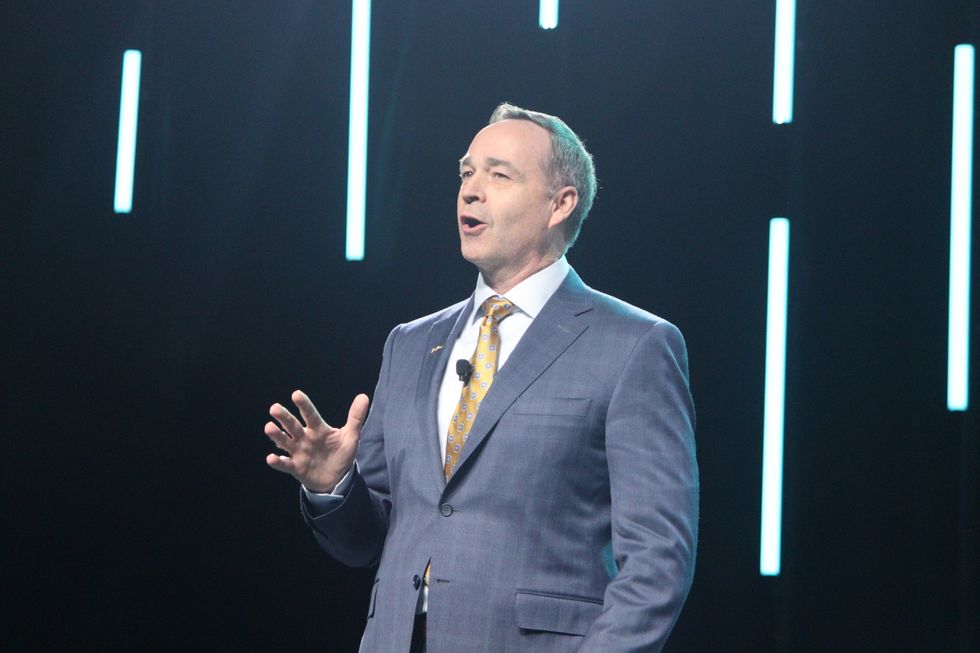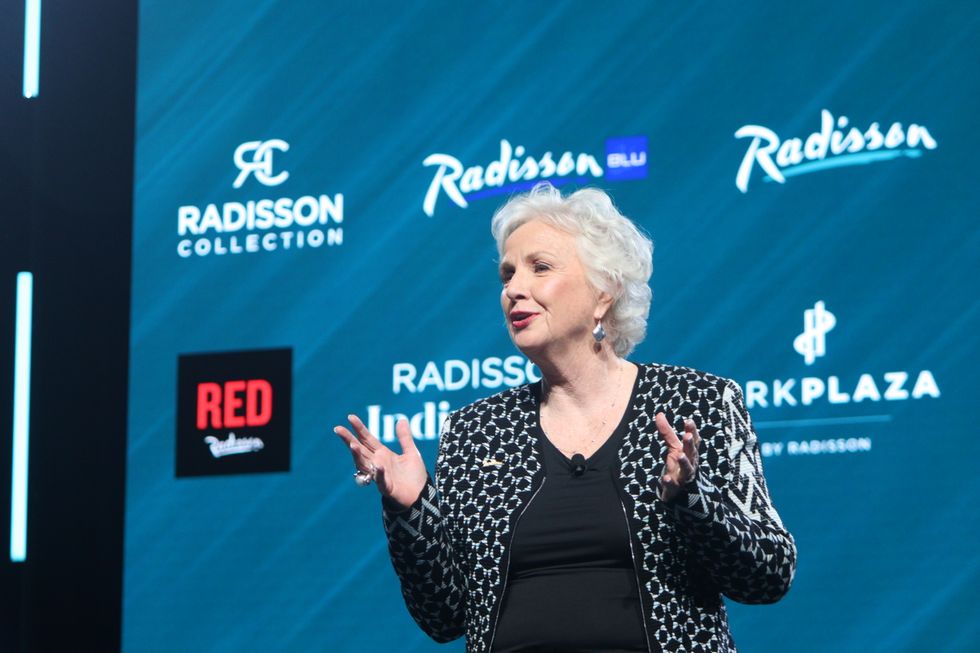In our exclusive Leadership Series interview, Pat Pacious, president and CEO of Choice Hotels International, reflects on his organization’s relationship with AAHOA, his opposition to the proposed New Jersey State legislation on fair franchising and why Asian hoteliers are still important to the company. In the end, he said, it’s about keeping state governments out of a dialogue that should be held between franchisers and their franchisees regarding subjects such as selling loyalty points and revenue from preferred vender programs.
Pacious also discussed other key topics in the conflict between AAHOA and several large hotel companies, including Choice as well as Marriott International. Also in the interview, held at Choice’s recent 67th Owner & Franchisee Convention in Las Vegas, Pacious discusses topics addressed at the convention, such as Choice’s recent acquisition of Radisson Hotels Americas. He also comments on the company’s offering to current and future franchisees and the importance of Asian American owners.
‘This is not about fair franchising’
In February, Choice announced it would “pause its partnership” with AAHOA, according to an alert to AAHOA members. AAHOA said Choice’s decision came in response to AAHOA’s 12 Points of Fair Franchising and its public support for New Jersey Assembly Bill A1958, which would make changes to the New Jersey Franchise Practices Act. Prior to Choice’s action, Marriott had announced it was withdrawing its support for AAHOA for the same reason, and both companies chose not to attend the 2023 AAHOA Conference and Trade Show in Los Angeles in early April. Other companies, including Hilton and IHG Hotels & Resorts, also did not attend.

Pacious put his company’s decision in a different light.
“This is not about fair franchising. Choice Hotels is probably the most franchisee friendly company, we always have been,” Pacious said. “We have had a long-standing relationship with AAHOA and the way we all move forward is through dialogue. And we are always open to dialogue, we've always made that the number one thing that we focus on. A lot of our owners are very much aware of what we're doing and support what we're doing, and the dialogue is where we're going to hopefully get back to a place where AAHOA and Choice are shoulder to shoulder again on the major issues that are facing our industry.”
Talks with AAHOA leadership are still ongoing, Pacious said. There are some sticking points.
“I think it's really around do you want a state government to be involved in your commercial contract?” Pacious said. “At the end of the day, we've always improved our relationship from a franchisee and franchiser perspective through conversations. That's the direction that we're headed and that's the direction we're going to stay.”
Pacious gave a similar response in a previous interview to explain Choice’s opposition to Arkansas House of Representatives House Bill 1783. The bill would modify the state’s Franchise Practices Act to give the state a larger role in settling differences between franchisers and franchisees.

“Franchising has been a fantastic wealth creator for small business people for over 50 years. And it is a model that has worked very well,” Pacious said. “The regulatory aspect of it has primarily been around disclosure between the franchiser and the franchisee who's buying that franchise whether it's a quick service restaurant or a hotel business, and that's worked very well. I think what you're seeing now is there are certain states where there's an effort to get the state between the franchiser and the franchisee. And that's not good for asset owners at the end of the day.”
Disclosure of the terms of franchise agreements already is required by federal law, Pacious said. There is no need for state legislatures to get involved.
“We feel very good about the existing relationships and the way that the franchiser/franchisee relationship has evolved, particularly in the hotel segment, is through dialogue and at Choice we have probably been the most franchisee friendly franchiser,” he said. “That's proven to be very effective, it's allowed us to listen to what their needs are and respond and allows us to make sure that there's brand consistency. That's been a very effective way of doing it is having two business partners sit down and have discussions as opposed to having a state come in because that is a blunt force instrument that doesn't understand every hotel was different, every market is different. And it doesn't allow for the flexibility that I think we've had as an industry to really drive a win-win for both sides.”
‘A small part of what we do’
Two of the main issues for AAHOA concern the direct sale of loyalty points by some brands and revenue generated by preferred vender programs through fees, rebates and commissions paid by participating venders. Pacious gave answers to Choice’s positions on both issues.
On the sale of Choice Rewards points, he said that is “a very small part of what we do.”
“We are not a big point seller,” Pacious said. “Those are dialogues, again, that I think are best left for us as a as a franchiser to be having directly with our with our owners.”
Pacious also said the top redemption for points is one free room night. In a later clarification, Choice said 89 percent of points redeemed and 85 percent of all redemptions in fiscal year 2022, were used towards Rewards nights.
“These nights are an important component of the Choice Privileges program. Once a guest earns a reward night, we find they become much more attached to the program and to Choice’s brands, driving repeat stays to earn more points and even more rewards,” Choice said.
According to Choice’s 2022 franchise disclosure document, the company brought in $86.9 million from franchisee purchases in 2021, including “revenues from Qualified Vendors and choiceADVANTAGE installation and support fees.” That equates to 8.14 percent of Choice’s total revenue for that year. Pacious gave an idea where at least some of that money goes.

“The money that we work with our vendors to create is what supports the massive trade show we're doing right now,” Pacious said. “If you look at the huge amount of commerce that's going on on that tradeshow floor, those vendors, it costs money for them to come here, it costs money for us to put the show on. That's how we spend our dollars to make sure that we're helping our owners find the best product at the lowest price. And we're very open with them about how we're working through that. And so again, through dialogue, that's where we get better venders, that's where we get better demand for the right product and that's really how we've always approached the procurement side of the business.”
Radisson incorporation almost complete
Pacious also said the company is on track to complete incorporation of the newly acquired Radisson properties by August. Choice has been working closely with Radisson Hotel Group on the transition.
“The sellers of the brands in the Americas, they picked us. They chose Choice Hotels because of the stewardship we've shown with our existing brands, and also our ability to grow brands,” Pacious said. “We are in partnership with them on the sort of global brand standards and logos and those types of things to maintain some consistency at that level, but allowing for the development in this particular market. If brands need to shift somewhat to attract the right developer. It gives both of us the flexibility to do that.”
The Radisson owners are particularly happy about Choice’s drive to increase drive direct reservations, bypassing OTAs, said Pacious.

“We have shifted this channel mix away from OTAs and towards the .com delivery that that we provide,” Pacious said. “In the conversations with the Radisson Hotel Group owners Country Inn and Suites and Radisson brand owners, they're really excited to get onto our platform, which we will be doing later this year, because of that ability to reduce the amount of third-party contribution and drive up their direct contribution, which is their lowest cost and highest rate delivery channel.”
The final word
Pacious said Asian Americans comprise around 60 percent of Choice’s franchisees.
“It has been growing as we have done a lot of work with that community to really help them get started,” Pacious said. “Once we get owners in our community, they don't like to leave, we have the industry's highest retention rate. They are always asking us what's coming next, what is Choice Hotels working on next that might meet the demand trends that we're going to see in the future and we always have some something new to bring to the table.”
Choice’s news for those curious franchisees is good, Pacious said.
“The future is exceptionally bright and the reason for that is what I call the five R's,” Pacious said. “We're seeing rising wages, we are seeing more retirements, we are seeing remote work, we are seeing the rebuilding of America with the infrastructure bill. And we're also seeing a lot more road trips. It's an exceptional set of trends.”
These are trends that Choice identified several years ago, Pacious said. They used the information to ensure that were offering the right product to put Choice’s hotels “in the sweet spot.”
“We saw these trends coming. We're ahead of the curve on them. We are out there with proven prototypes and proven brands in these segments that can really capitalize on that,” Pacious said. “We're looking at where this entire opportunity from a demand perspective is going to be the pie is getting larger, and our brands are in the right place to really capitalize on those trends. That's why I'm so bullish on our opportunity going forward.”


















